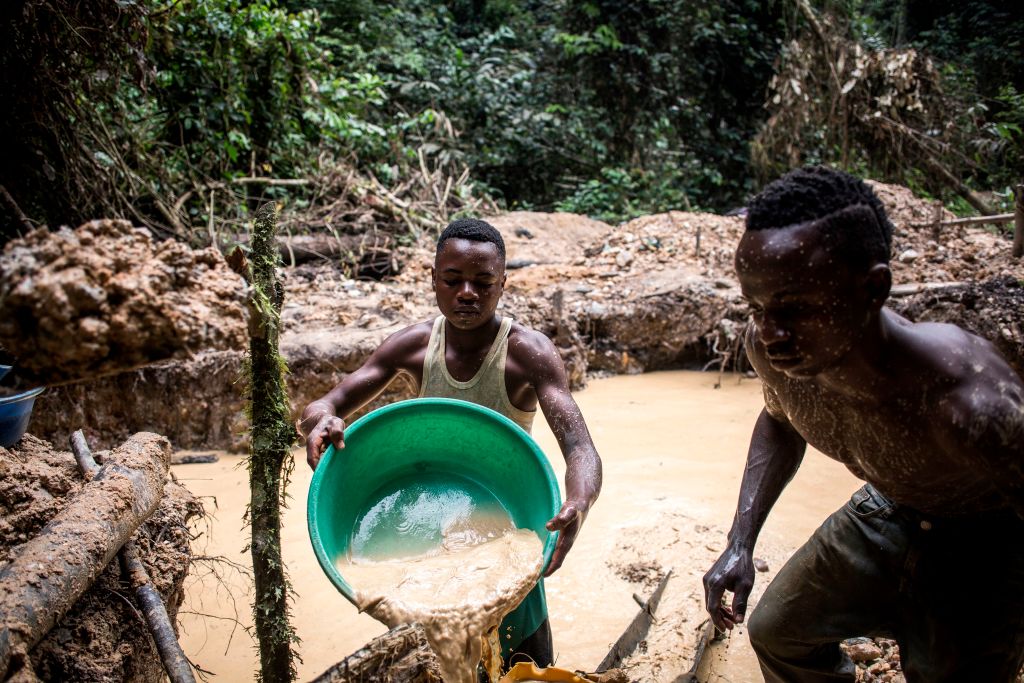Smuggling of ‘Conflict Gold’ Fuels Rebel Activity in Eastern DRC
ADF STAFF
At the Mitondo gold mine in the east of the Democratic Republic of the Congo (DRC), it’s easy to know who is in charge: They’re wearing red.
The Mitondo mine in South Kivu is officially operated by local authorities and the DRC government. But residents and workers know who is profiting — the Mai Mai Yakutumba, one of the many violent rebel groups that have operated in the region for decades.
Rebel activity has been funded by the illicit trade in gold scraped from the earth by men, women and children. The gold from Mitondo and other mines is typically smuggled through Uganda and Rwanda to the United Arab Emirates (UAE), from where it eventually finds its way into the global market.
Rebel groups like the Mai Mai Yakutumba benefit from the DRC’s gold mining in several ways. They force the miners to pay a “tax” each month to work in the stifling heat and meter-wide tunnels of the mines. They raid the mines and trade gold directly for weapons. They work with smugglers to transport the illicit gold out of the country where it can be laundered through the international market.
The rebels’ system of extortion and criminality supports attacks that are often directed at the Banyamulenge ethnic group. The rebels say the Tutsi group doesn’t belong in the DRC. They attack and burn villages, often raping and killing innocent people.
Esther Nanduhura, a Banyamulenge woman, knows personally how the illicit gold trade in eastern DRC fuels violence. Mai Mai Yakutumba rebels killed her 80-year-old father-in-law and injured his wife before removing Nanduhura, her husband and their eight children from their hiding place and forcing them to march for days with no food.
Nanduhura told dw.com that the rebels took her husband away. She eventually learned he had been hacked to death with machetes.
For Nanduhura, the DRC’s illicit gold market comes down to a simple equation:
“The Mai Mai sell gold to white people to buy weapons — that’s why they sell the gold,” she said. “I want to tell these white people to stop buying from them. So, they stop killing us with these weapons.”
Companies that trade in gold from the DRC are required to certify that it is conflict-free — not coming from conflict regions where the sale supports rebel groups. However, certificates are easily forged, and trading companies have few mechanisms for tracing the gold back to its source.
DRC law actually bans the export of gold from artisanal mines that are not certified as conflict-free. However, according to the U.N., only 60 of an estimated 1,500 gold mines are certified conflict-free. That means a large majority of gold miners are working in mines that fund conflict and nearly all the gold leaving the DRC does so illegally.
The United Nations estimates that between $300 million and $600 million in gold is smuggled out of the DRC each year. While some Belgian companies are involved in the DRC’s gold industry, much of the smuggled gold ends up in the UAE, which imported $37 billion in gold in 2020, making it one of the biggest players in the market.
Meanwhile, miners like Patrice Michael struggle to provide for their families knowing that their work is fueling the rebel groups that drive the violence around them.
“They take over what is most lucrative,” Michael told dw.com. “They know exactly which mine is producing most gold, down to which tunnel.”


Comments are closed.